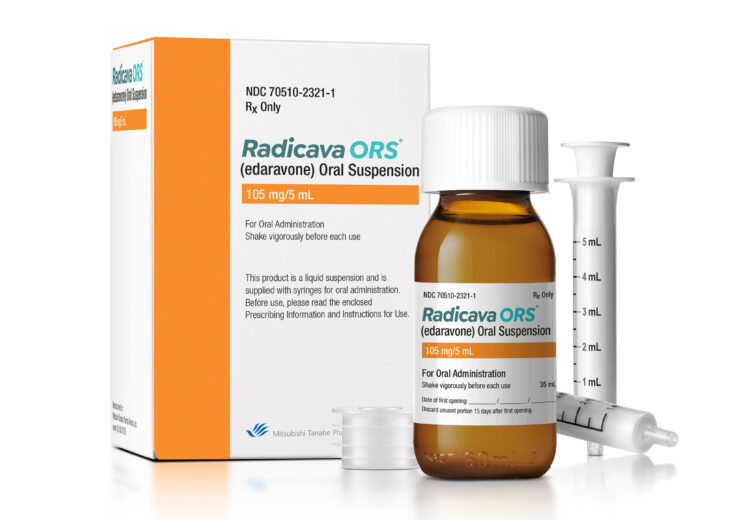Radicava ORS comes in a small, 5mL dose, with portable bottle, oral dosing syringe, and eliminates the need for prior refrigeration to provide a flexible administration option

RADICAVA ORS product shot. (Credit: Mitsubishi Tanabe Pharma America/PRNewswire)
Mitsubishi Tanabe Pharma America (MTPA) has received the US Food and Drug Administration (FDA) approval for Radicava ORS, the oral formulation of edaravone, to treat amyotrophic lateral sclerosis (ALS).
The drug was previously approved in the US, as an intravenous (IV) treatment, and the oral formulation would provide the same efficacy as IV infusion treatment, said the company.
Radicava was discovered and developed by Mitsubishi Tanabe Pharma Corp. (MTPC) and Mitsubishi Tanabe Pharma Development America (MTDA), and commercialised in the US by MTPA.
The oral formulation of the drug is taken as a daily treatment for 14 days straight, followed by a 14-day drug-free period for the initial treatment cycle.
Radicava ORS comes in a small, 5mL dose, with a portable bottle, oral dosing syringe, and eliminates the need for prior refrigeration to provide a flexible administration option, said the company.
MTPA president Atsushi Fujimoto said: “At MTPA, patients have been the driving force behind our work as we strive to develop meaningful treatment options for ALS and continue to tackle unmet needs.
“Five years ago, we proudly launched Radicava as a treatment option for patients with ALS in the U.S. Now, we continue to push the boundaries of innovation with Radicava ORS, an orally administered option allowing patients flexibility in how they take their medicine.”
The current FDA approval of Radicava ORS is based on results from several studies, including data from the Phase 3 clinical trial in 137 ALS patients.
In the Phase 3 trial, the treatment slowed the loss of physical function by 33% compared to placebo, as measured by the ALS Functional Rating Scale-Revised (ALSFRS-R).
ALSFRS-R is a rating instrument validated for monitoring disease progression in patients.
In addition, data from seven Phase 1 pharmacology trials in healthy individuals and ALS patients and a Phase 3 trial in 185 patients with ALS, also supported the approval.
The most common adverse events observed in patients treated with Radicava include bruising (contusion), gait disturbance and headache.
In addition, Hypersensitivity reactions and anaphylactic reactions have been reported in patients treated with Radicava.
Furthermore, an ongoing Phase 3 study is evaluating the long-term safety and tolerability of Radicava ORS, said the company.
University of Tennessee Health Science Centre neurology professor Tulio Bertorini said: “ALS is a progressive disease that, due to its heterogenous nature, impacts patients at different rates with varying symptoms.
“Therefore, it is crucial that patients have treatment and formulation options that accommodate their own unique needs, and RADICAVA ORS provides HCPs who have prescribed their ALS patients edaravone with an alternate delivery option.”
